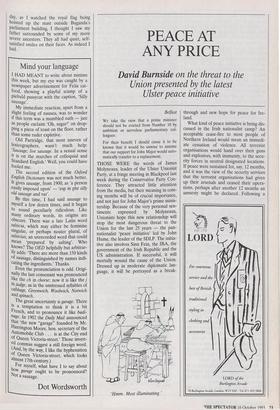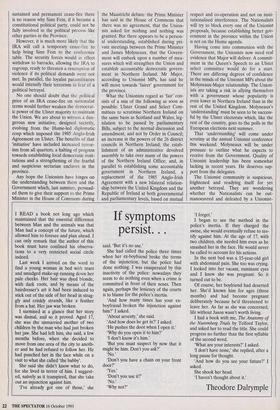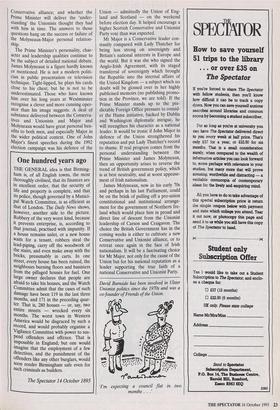PEACE AT ANY PRICE
David Burnside on the threat to the
Union presented by the latest Ulster peace initiative
Belfast We take the view that a prime minister should not be evicted from Number 10 by ambition or nerveless parliamentary col- leagues.
For their benefit I should cause it to be known that it would be. unwise to assume that our support for John Major would auto- matically transfer to a replacement-
THOSE WERE the words of James Molyneaux, leader of the Ulster Unionist Party, at a fringe meeting in Blackpool last week during the Conservative Party Con- ference. They attracted little attention from the media, but their meaning in com- ing months will be of crucial importance, and not just for John Major's prime minis- tership. Because of the very personal sen- timents expressed by Molyneaux, Unionists hope this new relationship will stop the most dangerous threat to the Union for the last 25 years — the pan- nationalist 'peace initiative' led by John Hume, the leader of the SDLP. The initia- tive also involves Sinn Fein, the IRA, the government of the Irish Republic and the US administration. If successful, it will mortally wound the cause of the Union. Dressed up in moderate diplomatic lan- guage, it will be portrayed as a break- limm. Most illuminating.' through and new hope for peace for Ire- land.
What kind of peace initiative is being dis- cussed in the Irish nationalist camp? An acceptable cease-fire to most people of Northern Ireland would mean an immedi- ate cessation of violence. All terrorist organisations would hand over their guns and explosives, with immunity, to the secu- rity forces in neutral designated locations. If peace were sustained for, say, 12 months, and it was the view of the security services that the terrorist organisations had given up their arsenals and ceased their opera- tions, perhaps after another 12 months an amnesty might be declared. Following a sustained and permanent cease-fire there is no reason why Sinn Fein, if it became a constitutional political party, could not be fully involved in the political process like other parties in the Province.
However, it is much more likely that the IRA will call a temporary cease-fire to help bring Sinn Fein to the conference table. The security forces would in effect withdraw to barracks, allowing the IRA to regroup, ready to threaten a resumption of violence if its political demands were not met. In parallel, the loyalist paramilitaries would intensify their terrorism in fear of a political betrayal.
No one should doubt that the political price of an IRA cease-fire on nationalist terms would further weaken the democrat- ic power of the Ulster majority to maintain the Union. We are about to witness a dan- gerous new initiative, designed secretly, evolving from the Hume-led diplomatic coup which imposed the 1985 Anglo-Irish Agreement on Ulster. The benefits of that `initiative' have included increased terror- ism from all quarters, a halting of progress towards establishing local democratic insti- tutions and a strengthening of the fearful and suspicious sectarian enclaves in the province.
Any hope the Unionists have hinges on the understanding between them and the Government which, last summer, persuad- ed them to give their support to the Prime Minister in the House of Commons during the Maastricht debate: the Prime Minister has said in the House of Commons that there was no agreement, that the Union- ists asked for nothing and nothing was granted. But there appears to be a person- al understanding, established during pri- vate meetings between the Prime Minister and James Molyneaux, that the Govern- ment will embark upon a number of mea- sures which will strengthen the Union and establish accountable democratic govern- ment in Northern Ireland. Mr Major, according to Unionist MPs, has said he will move towards 'fairer' government for the province.
What the Unionists regard as 'fair' con- sists of a mix of the following as soon as possible: Ulster Grand and Select Com- mittees to scrutinise Northern Ireland on the same basis as Scotland and Wales; leg- islation to be passed by parliamentary Bills, subject to the normal discussion and amendment, and not by Order in Council; an increase in the powers of the 26 district councils in Northern Ireland; the estab- lishment of an administrative devolved assembly to take over many of the powers of the Northern Ireland Office; and, in parallel to establishing some accountable government in Northern Ireland, a replacement of the 1985 Anglo-Irish Agreement with a new bilateral relation- ship between the United Kingdom and the Republic of Ireland at both governmental and parliamentary levels, based on mutual respect and co-operation and not on insti- tutionalised interference. The Nationalists will try to block every one of the Unionist proposals, because establishing better gov- ernment in the province within the Union is not on the Hume agenda.
Having come into communion with the Government, the Unionists now need real evidence that Major will deliver. A commit- ment in the Queen's Speech to an Ulster select committee would do for a start. There are differing degrees of confidence in the minds of the Unionist MPs about the Molyneaux-Major relationship. The Union- ists are taking a risk in allying themselves with a government whose popularity is even lower in Northern Ireland than in the rest of the United Kingdom. Molyneaux's `understanding' must be seen to be success- ful by the Ulster electorate which, like the rest of the country, goes to the polls in the European elections next summer.
That 'understanding' will come under scrutiny at the annual Unionist conference this weekend. Molyneaux will be under pressure to outline what he expects to receive from the Government. Quality of Unionist leadership has been somewhat lacking in recent years. He deserves sup- port from the delegates.
The Unionist community is suspicious, frightened and readying itself for yet another betrayal. They are wondering whether the Nationalists can be out- manoeuvred and defeated by a Unionist- Conservative alliance; and whether the Prime Minister will deliver the 'under- standing' the Unionists thought they had with him in time. The answers to those questions hang on the success or failure of the Molyneaux-Major personal relation- ship.
The Prime Minister's personality, char- acter and leadership qualities continue to be the subject of detailed national debate. James Molyneaux is a figure hardly known or mentioned. He is not a modern politi- cian in public presentation or television technique. Tight-lipped, he plays his cards close to his chest; but he is not to be underestimated. Those who have known him over his long years at Westminster recognise a clever and more cunning oper- ator than his image suggests. A deal of substance delivered between the Conserva- tives and Unionists and Major and Molyneaux would have great personal ben- efits to both men, and especially Major in the wider political context. One of John Major's finest speeches during the 1992 election campaign was his defence of the
Union — admittedly the Union of Eng- land and Scotland — on the weekend before election day. It helped encourage a higher Scottish Conservative and Unionist Party vote than was expected.
Mr Major is a Conservative leader con- stantly compared with Lady Thatcher for being less strong on sovereignty and Britain's national interests in Europe and the world. But it was she who signed the Anglo-Irish Agreement, with its staged transferral of sovereignty which brought the Republic into the internal affairs of the United Kingdom — a subject which no doubt will be glossed over in her highly publicised memoirs (no publishing promo- tion in the Province, we are told). If the Prime Minister stands up to the pre- dictable Foreign Office pressure to consid- er the Hume initiative, backed by Dublin and Washington diplomatic intrigue, he will strengthen his character as a national leader. It would be ironic if John Major in defence of the Union strengthened his reputation and put Lady Thatcher's record to shame. If real progress comes from the personal understanding between the Prime Minister and James Molyneaux, then an opportunity arises to reverse the trend of British government policy, which is at best neutrality, and at worst appease- ment of Irish nationalism.
James Molyneaux, now in his early 70s and perhaps in his last Parliament, could be on the brink of pulling off a pro-union constitutional and institutional arrange- ment for the government of Northern Ire- land which would place him in proud and direct line of descent from the Unionist leadership of Carson and Craigavon. The choice the British Government has in the coming weeks is either to cultivate a new Conservative and Unionist alliance, or to retreat once again in the face of Irish nationalism. It will be a fascinating choice for Mr Major, not only for the cause of the Union but for his national reputation as a leader supporting the true faith of a national Conservative and Unionist Party.
David Burnside has been involved in Ulster Unionist politics since the 1970s and was a co-founder of Friends of the Union.
'I'm expecting a council flat in two months . .




























































 Previous page
Previous page